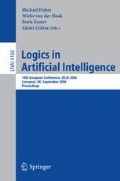Abstract
The most recent version of defeasible logic (Nute, 1997) is related to the well-founded semantics by translating defeasible theories into normal logic programs using a simple scheme proposed in (Brewka, 2001). It is found that by introducing ambiguity propagation into this logic, the assertions of defeasible theories coincide with the well-founded models of their logic program translations. Without this addition, the two formalisms are found to disagree in important cases.
A translation in the other direction is also provided. By treating default negated atoms as presumptions in defeasible logic, normal logic programs can be converted into equivalent defeasible theories.
Access this chapter
Tax calculation will be finalised at checkout
Purchases are for personal use only
Preview
Unable to display preview. Download preview PDF.
References
Antoniou, G., Maher, M.J.: Embedding defeasible logic into logic programs. In: Stuckey, P.J. (ed.) ICLP 2002. LNCS, vol. 2401, pp. 393–404. Springer, Heidelberg (2002)
Antoniou, G., Billington, D., Governatori, G., Maher, M.J., Rock, A.: A family of defeasible reasoning logics and its implementation. In: ECAI, pp. 459–463 (2000)
Brewka, G.: On the relationship between defeasible logic and well-founded semantics. In: Eiter, T., Faber, W., Truszczyński, M. (eds.) LPNMR 2001. LNCS, vol. 2173, pp. 121–132. Springer, Heidelberg (2001)
Emden, M.H.V., Kowalski, R.: The semantics of predicate logic as a programming language. Journal of the ACM 23, 733–742 (1976)
Gelder, A.V., Ross, K.A., Schlipf, J.: Unfounded sets and well-founded semantics for general logic programs. In: Proceedings 7th ACM Symposium on Principles of Database Systems, pp. 221–230 (1988)
Gelder, A.V., Ross, K.A., Schlipf, J.: The well-founded semantics for general logic programs. Journal of the ACM, 221–223 (1991)
Kunen, K.: Negation in logic programming. Journal of Logic Programming 4, 289–308 (1987)
Maier, F., Nute, D.: Relating defeasible logic to the well-founded semantics for normal logic programs. In: Delgrande, J.P., Schaub, T. (eds.) NMR (2006)
Makinson, D., Schechta, K.: Floating conclusions and zombie paths: two deep difficulties in the ’directly skeptical’ approach to inheritance nets. Artificial Intelligence 48, 199–209 (1991)
Nute, D.: Basic defeasible logic. In: del Cerro, L.F., Penttonen, M. (eds.) Intensional Logics for Programming, pp. 125–154. Oxford University Press, Oxford (1992)
Nute, D.: Defeasible logic. In: Gabbay, D., Hogger, C. (eds.) Handbook of Logic for Artificial Intelligence and Logic Programming, vol. III, pp. 353–395. Oxford University Press, Oxford (1994)
Nute, D.: Apparent obligation. In: Nute, D. (ed.) Defeasible Deontic Logic. Synthese Library, pp. 287–315. Kluwer Academic Publishers, Dordrecht (1997)
Nute, D.: Defeasible logic: Theory, implementation, and applications. In: Bartenstein, O., Geske, U., Hannebauer, M., Yoshie, O. (eds.) INAP 2001. LNCS, vol. 2543, pp. 87–114. Springer, Heidelberg (2003)
Reiter, R.: A logic for default reasoning. Artificial Intelligence 13, 81–132 (1980)
Author information
Authors and Affiliations
Editor information
Editors and Affiliations
Rights and permissions
Copyright information
© 2006 Springer-Verlag Berlin Heidelberg
About this paper
Cite this paper
Maier, F., Nute, D. (2006). Ambiguity Propagating Defeasible Logic and the Well-Founded Semantics. In: Fisher, M., van der Hoek, W., Konev, B., Lisitsa, A. (eds) Logics in Artificial Intelligence. JELIA 2006. Lecture Notes in Computer Science(), vol 4160. Springer, Berlin, Heidelberg. https://doi.org/10.1007/11853886_26
Download citation
DOI: https://doi.org/10.1007/11853886_26
Publisher Name: Springer, Berlin, Heidelberg
Print ISBN: 978-3-540-39625-3
Online ISBN: 978-3-540-39627-7
eBook Packages: Computer ScienceComputer Science (R0)

